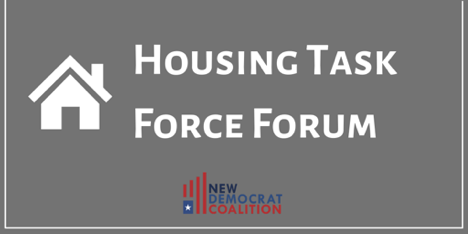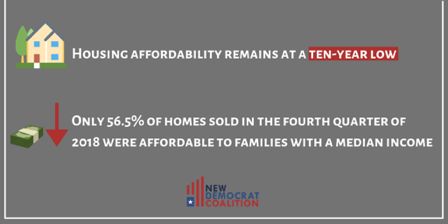How the Housing Supply Is (Not) Meeting Demand

The high cost of housing is the single biggest squeeze on household budgets and a significant drag on the economy. It is forcing Americans to live on the street, reducing GDP by trillions of dollars, substantially reducing Americans’ retirement savings, and undermining growth in a post-recession era.
The New Democrat Coalition knows affordable housing is paramount to the economic security of American families. That’s why the New Democrat Coalition Housing Task Force Co-Chairs Reps. Denny Heck, Katie Hill and Ben McAdams recently held a forum with two panels to discuss measurable solutions to address America’s housing crisis. The second panel included Mike Kingsella, the Executive Director of Up For Growth National Coalition; Jeff Brodsky, Vice Chairman for the National Multifamily Housing Council (NMHC); Tami Fischer, Executive Director and CEO of Metro West Housing Solutions; and Greg Ugalde, Chairman of the Board for the National Association of Home Builders. As this panel found, America faces a crisis of a lack of housing supply; not a crisis of a lack of housing demand.
Housing affordability and homelessness are not just a single issue area. They are the product of so many different problems. No one knows that better than NDC Housing Task Force Co-Chair Rep. Katie Hill, a housing expert who served as Executive Director of PATH, People Assisting the Homeless, which is the largest homeless services organization in the state of California.
“We have to take responsibility and commit ourselves to stopping the flow of people becoming homeless. We need to think about the people who are one missed paycheck away from losing their home, and we need to support these critical programs. It’s a crisis that we are facing in many communities, but if we don’t address it aggressively and proactively right now, then we will be dealing with the consequences on such a tremendous scale in the coming decades,” said Rep. Katie Hill.
As our report finds, zoning regulations limit the number of homes that can be built on any given area of land. Mike Kingsella, Executive Director of Up for Growth Action, discussed the need for updated infrastructure and zoning during his testimony. “We believe Congress and relevant federal agencies should take a place-based approach for eliminating barriers to housing,” said Kingsella. “This approach would maximize investments in the places that are job- and opportunity-rich but housing-poor. Areas with robust existing transportation and community infrastructure are most often the places where exclusionary zoning has prevented the construction of needed housing. This approach would also enable more housing to use less land and ensure the country’s growth comports with important climate change and environmental stewardship goals.”
Jeff Brodsky, Vice Chairman of the National Multifamily Housing Council, emphasized the need for both community development and housing programs. Brodsky said, “Transportation funds are what’s absolutely critical in distinguishing community development from housing. Funding that has to be explicitly provided to support best practices such as as-of-rights zoning, which are uniform, codified rules-based housing for all incomes, including inclusionary housing in high opportunity areas.”
Tami Fischer, Executive Director & CEO of Metro West Housing Solutions, discussed the need to prioritize financing of affordable housing projects. “One of the biggest things that Congress can do right now is to pass the latest version of Senator Maria Cantwell’s Housing Tax Credit Improvement Act,” said Fischer. “Low-income housing tax credits have been a proven public-private partnership, especially in Colorado, for housing authorities and for-profit housing developers to get things done.”

“There is a role for sensible regulations to protect health, safety and fair housing rights; however, when it accounts for 24% of the cost of a single family home or 32% of a multifamily project, affordability needs to be part of the larger discussion when developing or updating regulations,” said Greg Ugalde, Chairman of the Board for the National Association of Home Builders. “The homebuilding industry’s ability to address affordable housing needs is dependent on a housing finance system that provides adequate reliable credit. At present, homebuyers and builders continue to confront challenging credit conditions weighed down by an overzealous regulatory response to the great recession.” Ugalde goes on to say, “NAHB applauds the New Dems for starting these important conversations on the role that lending and land use play in housing affordability. NAHB stands ready to work with you to achieve thoughtful, effective policies to expand the availability of affordable housing throughout the country.”
Metro West Housing Solutions’ Executive Director Tami Fischer relayed comments from a local mayor in Colorado, saying: “Local housing authorities are a critical building block that create and foster vibrant and stable communities. The tools used to fund much-needed developments are a win-win for both the private sector and the city. With ever-rising rents in a booming city with needs that far outweigh the units being built, a vibrant city must have housing options for servers, retail, teachers, police, firefighters, seniors and other working residents. Working families and individuals are being priced out by the increasing cost of living, land acquisition and development.”
The NDC believes that while local and state governments need to act, Congress needs to be doing more at the federal level as well. To accommodate a growing population and other sources of new demand, as the NDC report notes, America is going to need more than a million additional housing units per year. This shocking reality is why NDC Members will continue to engage with stakeholders and constituents to better understand the contributing problems so Congress can better address the housing crisis.
Watch the second panel on Facebook here: Part 1, Part 2, Part 3.
By: New Democrat Coalition
Next Article Previous Article
